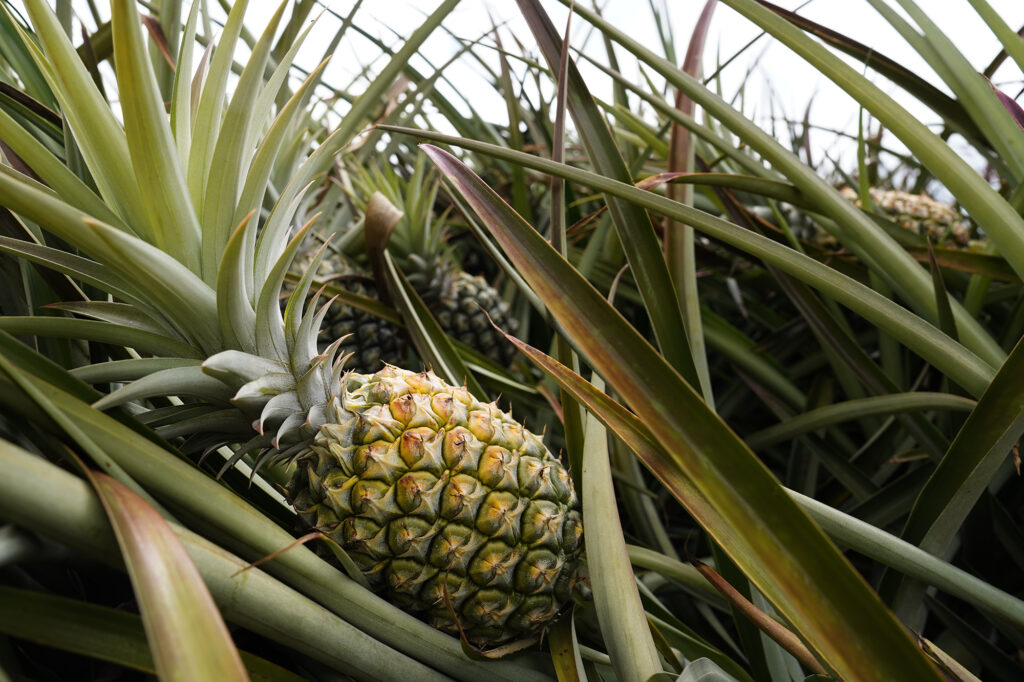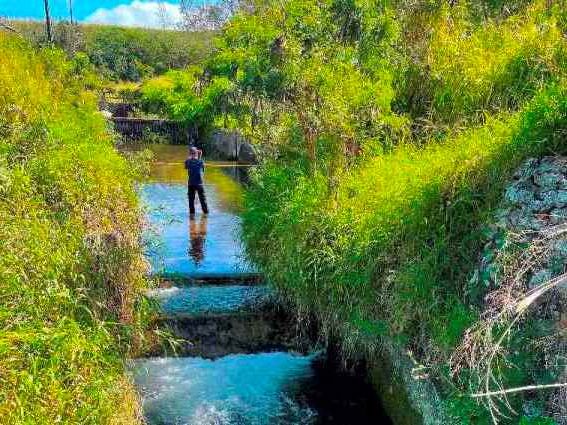A Japanese billionaire who founded the clothing brand Uniqlo has sued one of Hawaiʻi’s biggest land developers, alleging the company’s failure to maintain its century-old water system has contributed to water shortages in West Maui.
The suit, led by Tadashi Yanai, alleges Maui Land & Pineapple Co. has failed to maintain its century-old Honokōhau ditch system, which supplies water to the Kapalua area. The system dates to a time when Maui Land & Pineapple was one of Hawaiʻi’s largest pineapple producers and used the system to divert water to its fields.
But the company got out of the pineapple business more than a decade ago. And in recent years, the suit alleges, Maui Land & Pineapple has neglected its water system, causing “widespread harm to all who rely on the Honokōhau Stream and Ditch System, including farmers, residents, businesses, and government entities.”
 Now primarily a real estate and resort business, Maui Land & Pineapple got out of the pineapple business more than a decade ago. (Kevin Fujii/Civil Beat/2024)
Now primarily a real estate and resort business, Maui Land & Pineapple got out of the pineapple business more than a decade ago. (Kevin Fujii/Civil Beat/2024)
Yanai’s Honolulu-based TY Management Corp. owns and operates the Kapalua Plantation and Kapalua Bay golf courses, which it acquired from Maui Land & Pineapple, and has contracts under which Maui Land & Pineapple is supposed to provide non-potable irrigation water to the courses. The suit alleges that hasn’t been happening.
Joining Yanai are several residential developments and homeowners associations, which say they also have contractual relationships with Maui Land & Pineapple through Hawaiʻi Water Service, whose assets Maui Land & Pineapple previously owned.
In the 154 days leading up to the suit’s filing, the complaint says, Yanai and his fellow plaintiffs “have been restricted to using no irrigation water for 136 days, and restricted [to] using only forty percent of their historical irrigation water usage for the remaining 18 days.”
The suit, which was filed Monday in Hawaiʻi Circuit Court on Maui, asks the court to require Maui Land & Pineapple to honor its agreements and “undertake all commercially reasonable steps necessary to inspect, repair, and maintain the Ditch System … in a condition adequate for the reliable delivery of water.”
Yanai’s attorney, Grant Allison, declined to comment, citing the pending suit. Maui Land & Pineapple’s chief executive Race Randle said in a written statement that the suit appears to be part of the plaintiffs’ continuing efforts to obtain irrigation water “when West Maui is experiencing a historic drought.”
“We are following the clear guidance from the Commission on Water Resources Management (CWRM) to prioritize streamflow and traditional and customary uses, followed by delivery to the County of Maui to provide drinking water for Lahaina. We will continue to follow CWRM’s guidance.”
New Twist On West Maui Water Struggles
The suit underscores the critical state of West Maui’s water supply. The state’s water commission has designated West Maui a special Water Management Area, established for areas where “serious disputes respecting the use of surface water resources are occurring.”
The designation requires water users to obtain permits for new water uses and allows the commission to set standards to ensure streams, including those feeding Maui Land & Pineapple’s Honokōhau system, have an adequate flow of water to support things like aquatic life, recreation and Native Hawaiian cultural practices, including taro farming.
 A state worker measures water levels in the Maui Land & Pineapple Co.’s Honokōhau ditch system, which is at the center of a lawsuit. (Photo: Hawaiʻi Commission on Water Resource Management)
A state worker measures water levels in the Maui Land & Pineapple Co.’s Honokōhau ditch system, which is at the center of a lawsuit. (Photo: Hawaiʻi Commission on Water Resource Management)
Yanai’s suit adds a new wrinkle to the West Maui water disputes, arguing that Kapalua’s water shortages are not simply the result of less rainfall in the area, but rather Maui Land & Pineapple’s failure to maintain its system of dams, ditches and reservoirs so the company can keep providing water to users even in times of drought.
The suit cites U.S. Geological Survey data showing that the watershed region receives more annual rainfall than Seattle and Portland.
“Water is scarce not because rain is falling in significantly smaller quantities,” the suit alleges. “Rather, water is scarce because MLP has failed to honor its promises to maintain the infrastructure used to collect, carry, and store it properly.”
It adds: “Making matters worse, MLP has repeatedly said that it is planning to develop new luxury residences, hotels, and even a new golf course, all while it claims there is not enough water for the existing Kapalua community.”
Maui Land & Pineapple’s origins date to 1903, when Henry and David Baldwin started ranching cattle and growing pineapple on the island. In the 1970s, the company expanded into real estate development with its Kapalua Resort. It got out of the pineapple business in 2010. Its three main business areas are now land development and sales, leasing and resort amenities.
Civil Beat’s coverage of Maui County is supported in part by a grant from the Nuestro Futuro Foundation.
Civil Beat’s coverage of climate change and the environment is supported by The Healy Foundation, the Marisla Fund of the Hawai‘i Community Foundation and the Frost Family Foundation.

Sign up for our FREE morning newsletter and face each day more informed.
Sign Up
Sorry. That’s an invalid e-mail.
Thanks! We’ll send you a confirmation e-mail shortly.
